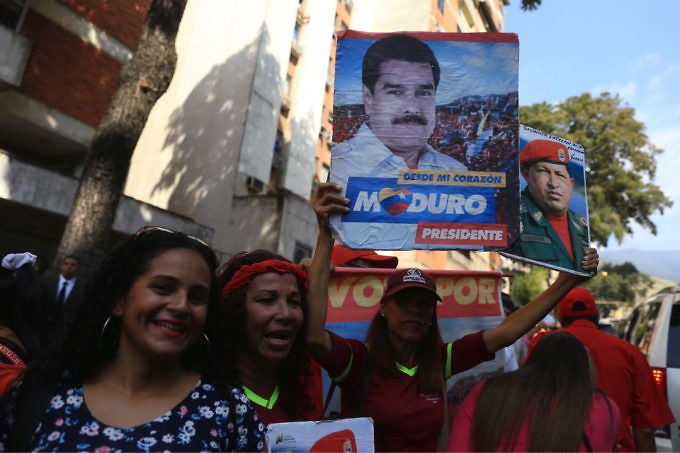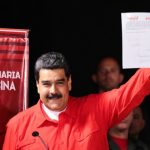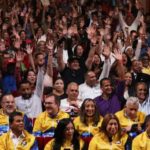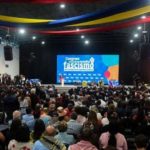THE MASSES OF VENEZUELA AND THE WORLD STAND UP TO THE NEW IMPERIALIST PROVOCATION. The United States, the Venezuelan & Latin American oligarchies as well as the big multinationals wish to break the existing ties between the people, the government and the army. None of this succeeded up to now, and although the most recent attempts are also the most dangerous, these will also fail.
The Bolivarian masses mobilise by the millions all over the country. On 2nd February, they reasserted their loyalty to the Chavista Revolutionary State by occupying the immense Bolivar Avenue in Caracas. They remain loyal to Maduro on whose steadfastness hangs the guarantee of the basic rights which they won up to now. They won rights through 15 years of blockade, economic provocations all sorts and ferocious world campaigns of lies. Incursions from Colombia tried to spread terror in Venezuela. Hospitals, schools and public institutions have kept being destroyed, but the way people identify with each other did not stop. It did not stop between the mass of the people and its leaders, or between them and the socialist perspective. This keeps Maduro solid and winning elections. The confidence of the Armed Forces rests upon this too. As for the Armed Forces, the reason for their continued engagement in the revolutionary process lies in the ability of the masses and their political intelligence.
Behold the most grotesque enactment of a State Coup in the history of Latin America! The United States are beating the drums of war against Venezuela, but they do so in the worst conditions (for them), and on a very difficult terrain. The United States face a population that is conscious and centralised. A population that is armed, right under the empire’s nose. In North America, the people oppose what their country is doing. You could observe their strong anti-imperialist leanings and left-wing tendencies in the US elections.
The US pacifist movement is a strong force too. It exerts a pressure that discourages the soldiers in a US army that just got beaten in the Middle East. In Syria, they had to fight terrorist organisations that their government had put in place! Hilary Clinton said as much when she admitted, about the Islamic State (IS), that: “it ended up escaping our control”. With their wars, Obama and now Trump failed, and fail again. Such people sow destruction and death, but they fail “to export democracy”. The opposite being the case. Bashar al Assad of Syria and the Iranian president Khamenei have stayed in power.
When did the Venezuelan people elect Juan Guaido? It is only the United States and world capitalism that prop him up:
The wish of the United States to have Guaido recognised as ‘interim president’ is not making the grade. It was rejected at the UN General Assembly, at the UN Security Council and even at the Organisation of the American States (OAS)! As for the European Union, it is divided on the subject. The opposition [to the West] of Russia and China shows not only that the US are isolated but that this conflict becomes global. The theatre of war is not going to stop at the frontiers of Venezuela with Colombia and Brazil. Any first blow against Venezuela will start a world reaction. The latter will overturning the equilibriums existing presently in the worlds’ relations. Shock waves will enter the countries of the imperialist powers, creating divisions, improving the ground for social explosions.
The minority government of Theresa May finds no way to exit the European Union. This is a situation where the theft of the Venezuelan gold reserves deposited in the British banks does not credit to that government. Macron of France picks a fight with Maduro but cannot cope with the Yellow Vests. In Italy, the government is heading for a crisis, as the Five Star Movement [1] refuses to recognise Juan Guaido [2]. In Spain, Podemos rejects the position of the Sanchez government [3] who sent an ultimatum to Maduro [4]. Podemos calls instead for a dialogue between the Venezuelan opposition and the Chavista government.
Oil is not the only motive for the United States: the latter cannot accept to lose ground in their ‘backyard’:
One of the main reasons that pits the United States (US) against Venezuela is the immense natural wealth of that country. This wealth was under right-wing control before Chavez came to government in the nineties. The big multinationals are very interested in the gas and oil reserves, the largest in the world; they have an eye too on the big deposits of gold, coltan and other precious metals. The US could do with appropriating these things to pump some oxygen in their economy – the latter being in crisis, uncompetitive, overburdened with huge public debt.
The US want to lay their hand upon this wealth, but what they want even more is to deal with is the Bolivarian revolution. The latter is a new socialist revolution right on the US door-steps. Like his predecessor Obama, president Trump clings to the ‘Monroe Doctrine’ according to which South America is the US backyard, and Trump needs to destroy the two principal poles of resistance: Cuba and Venezuela.
The steadfast resistance of Cuba and of the Bolivarian Revolution has been basic to the important revolutionary experiences made in a large part of Latin America. In the Venezuela built by Chavez, the population created grassroots social networks which have served to attenuate the effects of the economic war of imperialism. Moved aside by this process, the isolated right wings regrouped in the towns.
In the Maduro years, popular participation and workers control have intensified; the political weight of the workers grew a lot in the revolutionary process. Committees of Production and Supply (CLAPs) [5]) became common over the territory and in the neighbourhoods. The same happened with the Communal Councils; the latter concern themselves with controlling corruption, circumventing shortages and guaranteeing fairness in distribution. The introduction of the Carnet de la Patria (that identifies the recipients of food) helped to control the smuggling of subsidised supplies. In the last years, more than 1,500 enterprises were statised. Workers control became widespread over production and distribution. Each of these important steps has helped in dealing with internal speculation and the international blockade.
The Chavist experience is an immense inspiration for the revolutionary peoples and leaderships of Latin America and the world. In the world, there were important defeats in the 1990’s with the disappearance of the USSR and the socialist camp in Europe. There was a drop in the social weight of the major communist and socialist parties. It was however just after this, that the Chavez challenge came along, putting anti-capitalist transformation back at the centre of the social struggles. This put anti-imperialism and Socialism back on the order of the day. In various ways and at different levels, Latin America became an immense laboratory of democratic experience. Workers, peasants and indigenous populations embarked upon new schemes of participation. Aspects of financial and economic dependency on multinationals and world banks were broken. Social transformations led to big improvements in wealth distribution in many States of Latin America. Important steps of regional integration were started through ALBA, UNASUR and CELAC [6] for instance.
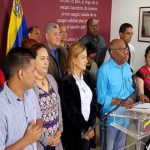
The results have been amazing in Venezuela. Millions have been lifted out of the destitution that imperialism and the regional oligarchies had always subjected them to. Social transformation gave access to education and eradicated illiteracy completely. The chronic illnesses of extreme poverty were wiped out and health became a right for everyone.
The “Mision Viviendas” (Housing) and the “Gran Mision Barrio Nuevo Tricolor” [7] have presided over the construction of 2,500.000 homes [8].
The indigenous populations now enjoy the rights to free speech and education that had always been denied them.
The rise of Mauricio Macri in Argentina and of Jair Bolsonaro in Brazil are transitory defeats for the left. Other transitory defeats have occurred – as in Argentina and Brazil for instance. Huge sums found their way into the pockets of so-called NGOs and lobbies to concoct “colour revolutions”. Some of these brought down Jose Manuel Zelaya, the progressive leader of Honduras, as well as Fernando Lugo of Paraguay and Dilma Rousseff of Brazil [9].
Judicial persecution was used in Argentina against Cristina Kirchner who lost the elections [10] and against Milagro Sala who was jailed [11]. In Brazil, the same judicial persecution got Lula jailed as well [12].
In Colombia, the FARC signed the peace accord but the right-wing government continues to send the paramilitary squadrons who have killed hundreds of trade unionists and peasant leaders. It is the same right wing that offers its services to the US military now, in preparation for a military intervention in Venezuela.
A new tide of progressive change in Mexico :
Just as the great tide of political and revolutionary social transformations seemed to be ebbing in Latin America of late, a new wave of progressive change wells up in Mexico. Lopez Obrador [13] has been elected president there, and on 2 December 2018, he invited Nicola Maduro to his swearing-in ceremony. He is firmly opposed to any recognition of Juan Guaido as ‘interim president’. Lopez Obrador sides with the Maduro government and encourages strongly the other South-American countries to do the same, like Bolivia and Uruguay.
Here is a remarkable irruption of Mexico on the political scene of the region. It proves that, if ultra-reactionary ‘coups de force’ from the likes of Bolsonaro, Macri and Duque (Colombia) achieve victories, these are temporary ones. They have no perspectives of their own. They have no hope to stay in power or impose durable fascist regimes. Their strength lies only in the weaknesses and limitations of the left leaderships. The large nationalist movements, the communist & socialist parties and the trade unions must initiate a serious process of reflection and self-criticism. This is needed to make headway. The need is for a common programme for the whole of Latin America. A programme for the social transformations of Latin America based on a common programme of economic & social development and popular participation.
In Venezuela, there are 2 million men and women in the militias. They are spread over the territory into 500 combat-units dedicated to the defence of Hugo Chavez’ inheritance.
The Civil-Military unity [14] that exists in Venezuela is of immense importance. It is an example to the whole world [15].
President Maduro declared that Bolivarian Venezuela will not allow a new Vietnam.
He saluted the great solidarity unfolding now in the United States for Venezuela.
He has appealed for a world mobilisation in support of the Bolivarian revolution.
Les Posadistes
9.2.2018
[1]Five Star Movement, M5S, was founded October 2009 by Beppe Grillo (a comedian) who is now its president. The present M5S leader is Luigi Di Maio. The latter met the Yellow Vests in Paris, much to the anger of Mr. Macron. (Editorial notes).
[2]Juan Guaido is the ‘interim president’ of Venezuela invented by the United States.
[3]Pedro Sanchez (Socialist Party of Spain) formed a government 7 June 2018 after winning a no-confidence vote in the Conservative Party’s leader Mariano Rajoy.
[4]Pedro Sanchez said to Nicola Maduro: “Eight days for you to recognize Guaido!”, to which Maduro replied: “Eight days for you to recognize Catalonia!”.
[5]“Comités de Abastecimiento y Producción”
[6]ALBA: Bolivarian Alliance for the Peoples of Latin America; UNASUR: Union of South American Nations; CELAC: Community of the American & Caribbean States.
[7]On 27.11.2018, the “Gran Misión Barrio Nuevo Tricolor” celebrated the rehabilitation of 1 million homes in the territorial area of Sucre and planted 56,000 trees. That November, it took part in the national Congreso AgroUrbano, and in the Feria Internacional de Ciencia & Tecnología,the Fic-Tec18, that aims at the fuller industrialisation of the country. There, the population had been invited to take part.
[8]http://ciudadccs.info/gran-mision-barrio-nuevo-barrio-tricolor-llega-al-hito-millon-viviendas-rehabilitadas/
[9]José Manuel Zelaya Rosales was thrown out of government by a coup on 26.6.2009. Fernando Lugo was impeached in June 2012, and Dilma Rousseff was impeached on 2.12.2015. All these leaders had been elected.
[10]Cristina Elisabet Kirchner was president of Argentina 2007-2015. She was elected twice. She nationalised the private pension funds; renationalised the YPF energy company; established a universal allocation for every child; got murderous killers of the ‘Dirty War’ found, tried and convicted. She was judicially discredited by never-proven accusations.
[11]Milagro Amalia Ángela Salais: a leader of the Tumac Amaru Neighbourhood Association in Argentina. She formed part of the Piquetero movement. She was arrested in January 2016 for alleged fraud and recently (2019) sentenced to 13 years in prison. Amnesty International has protested this imprisonment, deeming it ‘political’.
[12]Luiz Ignacio Lula da Silva, elected president 2002 and 2006, sentenced to 12 years in prison on 7. 4.18 on unproven charges of corruption and money laundering.
[13]Andres Manuel Lopez Obrador (AMLO) was elected president of Mexico in 2018 via his electoral platform “Juntos Haremos Historia”. He promises increased social services and more State control over resources. He was the progressive Mayor of Mexico City.
[14]https://posadiststoday.com/venezuela-the-military-commits-to-the-deepening-of-the-socialist-road/
[15]https://posadiststoday.com/venezuela-book-by-jesus-antonio-barrios-quintero/
